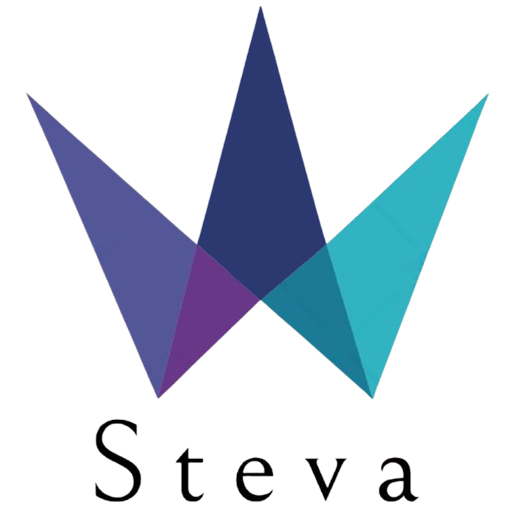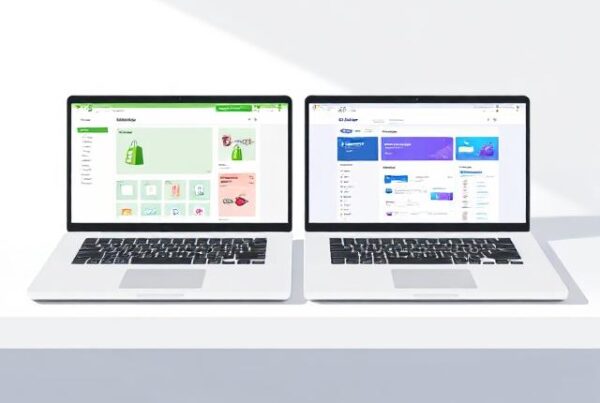Shopify Development in Brooklyn has become increasingly vital, especially since Shopify now powers 28% of all websites in the United States. When building your online store, choosing the right developer can make the difference between a thriving and struggling business. With Shopify capturing 10% of the global eCommerce software market, its platform offers tremendous potential, particularly for small businesses and enterprises.
Finding the best Shopify development company in your area requires careful consideration. Many Shopify website development agencies in the Brooklyn and Shopify NYC scene offer varying expertise and price points, with average project costs ranging from $10,000 to $49,000.
Additionally, hourly rates for Shopify Development in Brooklyn, New York, can vary significantly, ranging from $25 to $300, depending on the agency’s expertise. This guide shares seven expert tips to help you confidently hire a Shopify expert in NYC. The right developer can turn your Brooklyn e-commerce goals into a successful, high-performing online store tailored to your unique business needs.
Understand the Shopify Development Brooklyn Ecosystem

The Brooklyn tech landscape has evolved into a thriving hub for eCommerce expertise, with Shopify development taking center stage in this bustling borough. Before selecting a developer for your online store, understanding the broader Shopify ecosystem in Brooklyn provides crucial context for making an informed decision.
1. Shopify’s Market Share in NYC eCommerce
According to Statista, Shopify leads the US eCommeUSe platform market, powering about 30% of all eCommerce websites as of January 2025. It surpasses competitors like Wix Stores and WooCommerce, proving its dominance and appeal to entrepreneurs aiming to build scalable, professional online stores.
New York is a major Shopify hotspot. Of the 2.9 million US ShopifUSstores, around 41,400 operate in New York, ranking it second nationwide. It creates a strong local network of developers, designers, and strategists specializing in Shopify-powered business solutions for various industries.
Brooklyn stands out in this thriving ecosystem. At the same time, California leads with 91,000 Shopify businesses, and Brooklyn benefits from New York’s substantial share. Explained by Kinsta, local developers often collaborate, sharpen skills, and meet diverse client demands. Shopify’s 10.3% GMV share, second only to Amazon, is driving increasing demand for Brooklyn-based Shopify talent.
2. Why Brooklyn is a Hub for Shopify Experts
Brooklyn has become a hub for Shopify expertise due to its reputation as a creative center attracting digital agencies specializing in design and technology, essential for exceptional Shopify development; this is evident in the presence of established partners like Eastside Co at 81 Prospect Street, boasting an extensive portfolio of over 500 Shopify site builds, including 70 Shopify Plus implementations for major brands, demonstrating the substantial experience Brooklyn-based developers bring to new projects.
Brooklyn-based Shopify experts frequently offer comprehensive service packages beyond basic development. Many agencies provide:
- Full-spectrum development from custom themes and UX strategy to advanced backend functionality.
- Conversion rate optimization is specifically tailored to Shopify stores.
- Ongoing website management and maintenance services.
- Industry-specific expertise in sectors like consumer packaged goods, home and garden, jewelry, and lifestyle brands.
Brooklyn’s role in the NYC business scene gives local Shopify developers a competitive edge. They blend deep knowledge of the city’s retail environment with global eCommerce strategies. It allows them to craft high-performing stores for one of the world’s toughest markets.
The borough also boasts strong Shopify Plus developers’ expertise. Many agencies have achieved Partner certification, and Brooklyn offers services ranging from boutique firms to large teams. As Shopify grows, especially in North America, Brooklyn’s developer talent continues to expand and thrive.
Tip 1: Check for Shopify Partner Certification
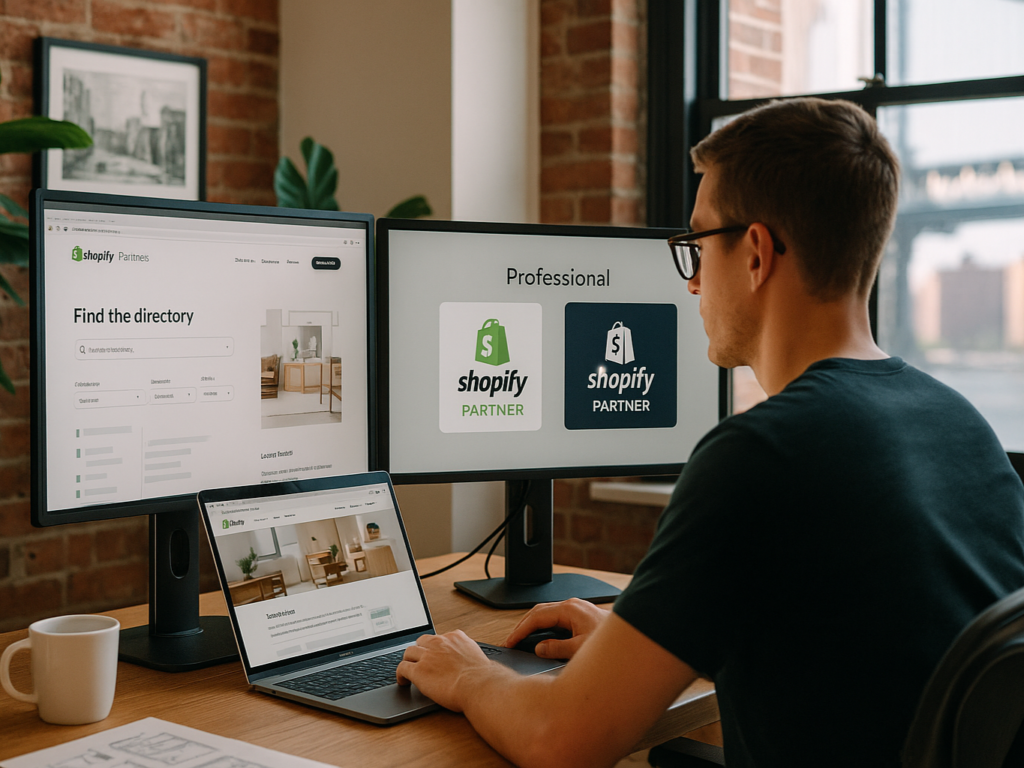
Verifying a developer’s Shopify Partner certification provides crucial insight into their legitimacy and expertise before committing to any development project. This qualification proves that a developer possesses the necessary skills to build and manage effective Shopify stores.
1. How to Verify Shopify Partner Status
Described by Shopify, the Shopify Partner Program is an official credentialing system designed for organizations that align with Shopify’s vision “to make commerce better for everyone.” Unlike general web developers, Certified Shopify Partners have demonstrated specific platform knowledge through Shopify’s verification processes.
To confirm a developer’s certification status, follow these straightforward steps:
- Check the Shopify Partners Directory: Authentic Shopify Partners will appear in the official directory, the most reliable verification method.
- Review their certification level: The Shopify Partner Program includes different tiers that indicate expertise level:
- Select Entry-level certification
- Plus: Advanced expertise
- Premier: High-level specialization
- Platinum: Highest tier recognition
- Verify Plus Partner status: Shopify Plus developers represent an elite group handpicked by Shopify for their exceptional reliability and quality. As noted by PageFly, these partners must demonstrate experience with high-growth merchants, possess advanced technical expertise, and complete at least three successful Shopify referrals within 12 months.
- Examine specific credentials: Beyond basic partnership, look for specialized certifications in app development, theme development, or store operations.
It’s important to note that while anyone can create a partner account on Shopify, certified partners have completed specific requirements and training. Therefore, always request references and examples of previous work rather than relying solely on claimed certification.
2. Benefits of Working with Certified Shopify Experts in NYC
Partnering with certified Shopify experts in the Brooklyn e-commerce area offers numerous advantages for businesses seeking eCommerce excellence.
- First, certified Shopify experts receive continuous education through official channels. The Shopify Partner Academy provides comprehensive training on platform usage, merchant collaboration, and effective value pitching. This ongoing education ensures they remain current with Shopify’s constantly evolving features and best practices.
- Second, certified partners gain access to enhanced resources that benefit their clients. The program provides partners unlimited test stores, specialized tools, and exclusive incentives. It translates to more efficient development processes and potentially cost-effective solutions for your business.
- Third, certification indicates a developer’s commitment to quality standards. To maintain their status, certified partners must consistently demonstrate expertise and successful implementations. This accountability factor creates an additional layer of quality assurance for Brooklyn businesses seeking reliable Shopify Development Brooklyn services.
For enterprises with complex needs, Shopify Plus developers offer unmatched expertise. These top-tier developers receive exclusive training, commissions, and public recognition from Shopify. Their advanced skills are especially beneficial for high-volume merchants and businesses requiring customized features, seamless integrations, or enterprise-level eCommerce strategies to drive growth and efficiency.
Brooklyn’s competitive e-commerce scene, often called Brooklyn e-commerce, is home to many certified Shopify experts who combine technical proficiency with local market insight. Certified partners display digital badges highlighting their specialties in theme development, checkout customization, or strategic planning. Verifying certification ensures you select a developer with proven capabilities tailored to your project needs.
Tip 2: Evaluate Their Shopify Portfolio Depth
After examining a developer’s certification status, focus on their portfolio and the tangible evidence of their capabilities and experience. A thorough portfolio review reveals far more about a developer’s expertise than any claims they might make.
1. Look for Shopify Plus Projects
When reviewing portfolios of potential Shopify Development Brooklyn partners, please pay close attention to their experience with Shopify Plus projects. This enterprise-level platform indicates advanced expertise that can benefit businesses anticipating significant growth. According to MoldStud, brands using Shopify Plus typically experience a 50% increase in sales within their first six months on the platform.
Experienced Shopify Plus developers demonstrate capabilities in:
- Building scalable architecture that supports high-volume transactions
- Implementing complex customizations specific to enterprise needs
- Managing advanced API integrations across multiple systems
- Creating custom checkout experiences only available at the Plus level
Recommended by MoldStud, you should request that potential developers showcase at least five previous projects in their portfolio. This diversity helps you assess their adaptability across different business models and industries. As you review these projects, look beyond mere aesthetics and examine the functionality, custom features, and overall user journey implementation.
In the competitive Brooklyn e-commerce landscape, developers with Shopify Plus experience bring valuable insights regarding the scalability challenges many growing businesses face. Ask specific questions about how they’ve helped previous clients transition from standard Shopify to Plus or how they’ve implemented Plus-exclusive features to solve business problems.
2. Assess UI/UX Quality and Mobile Responsiveness
A developer’s portfolio should demonstrate their ability to create intuitive, visually appealing interfaces that convert visitors into customers. As you evaluate UX/UI elements, focus on:
- Clean layouts and visual consistency: Examine if the developer maintains consistent visual elements throughout their portfolio work, including icons, buttons, and overall aesthetics
- Intuitive navigation: Can you easily find products, information and complete desired actions?
- Thoughtful interaction design: Does the portfolio show evidence of user research informing design decisions?
- Creative problem-solving: Look for unique design elements and original concepts that enhance the shopping experience
Mobile responsiveness has become non-negotiable in modern e-commerce development. By 2025, mobile commerce will account for approximately 75% of global e-commerce sales. Consequently, your developer must excel at creating responsive experiences across all devices.
When assessing mobile responsiveness in a portfolio, check if:
- Product images and descriptions are properly optimized for smaller screens
- Navigation elements adapt appropriately to different device sizes
- Text remains readable without zooming
- Interactive elements (like add-to-cart buttons) are easily tappable on touchscreens
- The checkout process works seamlessly on mobile devices
When reviewing portfolios, ask developers about mobile optimization challenges and how they solved them. Their responses reveal technical strengths and problem-solving skills. If you notice questionable design choices, don’t hesitate to ask why they were made. Developers follow client requests rather than using best practices or technical logic.
Tip 3: Ask About Theme Customization Experience
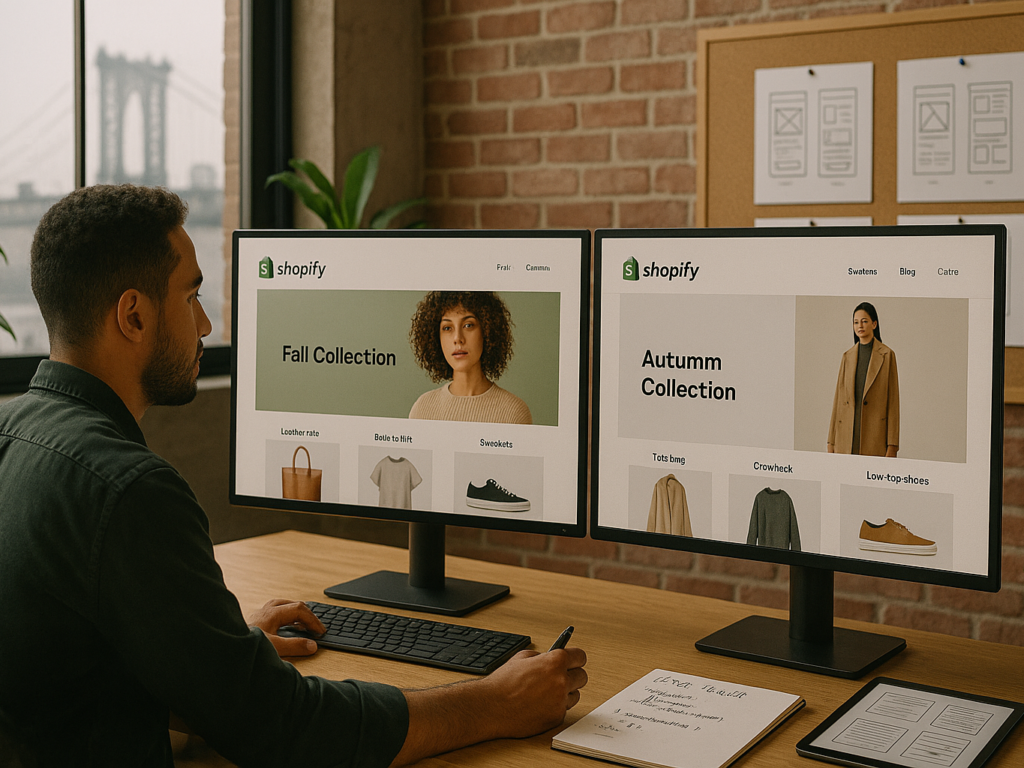
Theme customization forms the backbone of successful Shopify stores, affecting visual appeal and functionality. When interviewing potential Shopify developers in Brooklyn, their experience with theme customization should be a decisive factor in your selection process.
1. Brooklyn Theme vs. Custom Themes
Choosing between using pre-built themes like Brooklyn or investing in custom development significantly impacts your store’s uniqueness and capabilities. Brooklyn is a free Shopify theme that ranks among the top five highest-converting Shopify themes. This theme suits clothing businesses and fashion retailers, offering a clean, elegant design that naturally draws customers to products.
Although Brooklyn is highly customizable through theme settings, allowing adjustments to fonts, colors, and social media links, it has limitations compared to custom themes. As noted by the Shopify Community, Brooklyn is considered a “vintage” theme that doesn’t support Shopify’s latest features. Essentially, you’ll need to weigh these considerations:
Pre-built themes (like Brooklyn):
- Cost-effective solution with one-time fees ranging from $180 to $350 for premium themes
- Quick setup with straightforward usability
- Basic customization options (colors, fonts, layout)
- Limited unique branding opportunities
- It may restrict advanced functionality
Custom themes:
- Tailored specifically for your business needs and brand identity
- Complete design freedom and control over features
- Better scalability as your business grows
- Higher initial investment (custom themes can take 12-16 weeks to develop)
- Ability to integrate custom functionalities for specific requirements
When questioning potential developers, ask about their experience with both approaches. Skilled Shopify Development Brooklyn agencies in Brooklyn should articulate the pros and cons of each option based on your specific business goals, timeline, and budget.
2. Experience with Shopify Theme App Extensions
Theme app extensions represent Shopify’s newer approach to integrating apps with themes. Hence, developers’ proficiency with this technology indicates their currency with platform advancements. Introduced with Online Store 2.0, these extensions enable apps to interact seamlessly with themes without requiring merchants to modify theme code.
Indeed, this technology offers significant advantages:
- Cleaner integration: Apps using theme app extensions don’t alter your theme’s core code, maintaining stability even when apps are updated
- Simplified installation: Merchants no longer need to edit theme code to install apps manually
- Theme-agnostic functionality: App blocks automatically work across all Online Store 2.0 compatible themes
- Seamless uninstalls: No redundant code remains in your theme when removing apps.
Inquire about your developer’s experience with:
- Building and implementing app blocks (which inject inline content into pages)
- Working with app embed blocks (for apps without UI components or using floating elements)
- Understanding the differences between vintage themes and Online Store 2.0 themes
Qualified Shopify experts in NYC must understand Liquid’s core scripting language. Mastery of Liquid helps them efficiently manage data and optimize theme performance, which is crucial for customizing and enhancing your store’s functionality.
Brooklyn is a vintage theme, so ask how developers modernize its features while preserving design strengths. Experienced developers often recommend hybrid approaches or customizing existing themes, which can save up to 50% of development time. Good theme customization improves conversions and overall business success.
Tip 4: Prioritize Agencies with CRO and SEO Skills

Beyond certifications, portfolios, and theme expertise, the most effective Shopify developers possess critical technical skills that directly impact your store’s performance. CRO (Conversion Rate Optimization) and SEO (Search Engine Optimization) capabilities often separate valuable agencies from those merely offering basic development services.
1. Conversion Rate Optimization for Shopify Stores
CRO focuses on increasing the percentage of visitors who take desired actions on your website, such as making purchases, signing up for newsletters, or adding products to carts. According to Toptal, in today’s competitive landscape, this skill is indispensable, as industry benchmarks suggest the average conversion rate for most Brooklyn e-commerce stores ranges between 2.3% and 3%. Yet, Shopify stores average closer to 1.4%.
When evaluating Shopify experts in NYC, look for agencies that demonstrate the following:
- Data-driven audit capabilities: Qualified agencies start with a comprehensive analysis of current conversion rates, identifying friction points through heat maps, session recordings, and analytics.
- A/B testing proficiency: Experienced CRO practitioners systematically test different website variations to determine which elements drive more conversions.
- Personalization expertise: Tools like Optimizely allow the creation of tailored content based on customer behavior, fostering higher engagement.
One Brooklyn-based Shopify Partner notes in their client testimonial: “Dan not only has the technical skills but is also creative in coming up with ideas and strategies to improve Conversion Rate.” Indeed, exceptional CRO services should include analyzing user behavior, formulating data-driven hypotheses, implementing changes, testing results, and refining strategies based on outcomes.
In essence, CRO optimization focuses on streamlining checkout processes, optimizing product pages, and enhancing site speed. These are all critical factors, as studies show nearly 70% of consumers admit page speed impacts their willingness to purchase from online retailers.
2. SEO Integration in Shopify Website Development
SEO capabilities in your Shopify development Brooklyn partner, ensure your store gains visibility among potential customers. As the foundation of organic traffic, SEO reduces reliance on paid advertising while building credibility with your audience.
When assessing a Shopify website development agency’s SEO expertise, prioritize those who understand:
- Technical Shopify-specific SEO includes mobile optimization (critical as over 6.47 billion active mobile internet users browse predominantly on phones), site speed improvements, and proper sitemap implementation.
- Content optimization strategies: Look for agencies that integrate SEO fundamentals like keyword research into product descriptions, meta tags, URL structures, and image alt text.
- SEO-CRO balance: The best developers recognize that “CRO and search engine optimization (SEO) go hand-in-hand. Search engines like Google prioritize site speed and user experience, meaning poor CRO practices can affect your search engine ranking”.
Dedicated Shopify SEO teams use a holistic, data-driven strategy combining content marketing, technical optimization, and digital PR to deliver strong commercial results. This approach helps your store rank higher in search results and attract customers ready to purchase.
Experienced Shopify developers know optimization goes beyond keywords. They focus on high-quality content that builds credibility with search engines and engages visitors. One agency secured top Google rankings within three months. Choosing a Shopify partner with SEO and CRO skills ensures your store attracts traffic and converts visitors effectively.
Tip 5: Clarify Post-Launch Support and Maintenance
Securing a successful store launch represents just the beginning of your Shopify journey. Post-launch support determines whether your online store thrives or struggles over time. As you evaluate potential Shopify Development Brooklyn partners, carefully examine their ongoing maintenance offerings and response protocols.
1. Ongoing Shopify Maintenance Services
Post-launch maintenance ensures your store remains secure, functional, and optimized for growth. Many Brooklyn-based Shopify experts neglect this critical phase: As highlighted by Shopify Partners Blog, “The unfortunate truth about many freelancers and agencies within the web design industry is that their services ultimately cease as soon as the bill has been paid.”
Effective Shopify maintenance typically includes:
- Regular security updates: Protecting your store from vulnerabilities through timely patches, malware scans, and proactive defense strategies
- Performance optimization: Improving speed, functionality, and user experience through regular evaluations
- Bug fixes and issue resolution: Promptly addressing technical problems to minimize disruptions
- Third-party app integration: Managing updates and ensuring compatibility with Shopify’s latest versions
- Regular data backups: Safeguarding critical information with scheduled backups
Before signing any agreement, ask potential developers about their specific maintenance packages. Some agencies offer tiered support plans with varying service levels; others provide custom maintenance solutions tailored to your store’s unique needs. Professional Shopify maintenance teams should proactively monitor your store, identify potential issues before they escalate, and implement updates during off-peak hours to minimize disruption.
2. Support SLAs and Response Times
A Service Level Agreement (SLA) is essential for clear, measurable support standards and accountability between you and your Shopify developer. When choosing Brooklyn-based agencies, insist on specific response times and issue severity classifications rather than vague promises like “as soon as possible” to ensure reliable business planning.
Quality SLAs typically define different priority levels with associated timeframes:
- Priority 1 (Critical): Site down/checkout failures: 1-2 hour response (24/7)
- Priority 2 (Major): Issues affecting a significant customer percentage: 2-8 hour response
- Priority 3 (Minor): Non-transaction affecting issues: 24-48 hour response
Comprehensive SLAs should detail roles, responsibilities, maintenance schedules, support channels, and remedies for service failures. Verify if the support team is available during peak times and offers 24/7 monitoring for critical issues. Since Shopify doesn’t support third-party apps, strong developer support is vital for your store’s success.
Tip 6: Compare Pricing Models and Project Scope

Understanding pricing structures is critical when you decide to hire a Shopify expert in NYC or Brooklyn. Different pricing approaches can significantly impact your budget, project timeline, and overall satisfaction with the development process.
1. Fixed vs. Hourly Pricing for Shopify Projects
When evaluating Shopify experts in NYC, you’ll encounter two primary pricing models:
Fixed pricing (project-based) offers a predetermined fee covering all work associated with your project. This approach works exceptionally well for projects with clearly defined requirements and scope. Initially, developers assess the project scope to determine their minimum acceptable price and the amount needed to break even, and then they add a profit margin.
Advantages of fixed pricing:
- Predictable budgeting with no surprises
- Simplified payment structure
- Higher perceived value for quick projects
- Works well for repetitive, well-defined tasks
Drawbacks of fixed pricing:
- Requires detailed requirements upfront
- Limited flexibility for scope changes
- May include higher margins to offset risk
Hourly pricing involves billing for actual time spent on development. This model typically starts with a goal-oriented scope and estimated hours. According to Bytes Farms, hourly rates for Shopify developers vary considerably based on expertise, ranging from $15/hour for beginners to $95/hour for experts.
Advantages of hourly pricing:
- Greater flexibility for evolving requirements
- Focus on goals rather than specific tasks
- Allows for discovery and refinement during development
Drawbacks of hourly pricing:
- Unpredictable final costs
- Payment typically occurs after work completion
- It may feel more expensive for quick tasks
2. Minimum Project Budgets in Brooklyn eCommerce
Budget expectations for Shopify development Brooklyn vary based on project complexity:
- Basic store setup: $300-$2,000
- Medium-sized store: $2,500-$5,000
- Enterprise-level Shopify store: $10,000-$35,000
Geographical location plays a significant role in developer rates. US and CanUSian developers typically charge between $50 and $150 per hour, while Asian developers offer lower rates, around $20 to $45 per hour. This difference provides opportunities to optimize costs without compromising quality.
When evaluating Shopify development costs, also factor in platform fees. Plans range from €19/month (Basic) to €289/month (Advanced), with Shopify Plus developers starting at $2,300/month. Comparing Brooklyn agency quotes means assessing pricing and included services, ensuring low-cost options don’t sacrifice testing or support, and premium prices justify expertise and results.
Tip 7: Read Verified Client Reviews and Case Studies
Client testimonials are crucial evidence when evaluating the skills and reliability of Shopify developers in Brooklyn. A thorough examination of reviews and case studies ultimately helps you avoid partnerships with unqualified or dishonest developers who might underdeliver.
1. Where to Find Authentic Client Feedback
First and foremost, check multiple sources for comprehensive review coverage:
- Shopify Partner Directory: Official listings include verified reviews from merchants who have worked with the developer
- Third-party platforms: Sites like Upwork, Toptal, and PeoplePerHour display ratings and detailed feedback from previous clients
- Case study collections: Examine the developer’s website for in-depth project analyses that demonstrate problem-solving abilities
- Industry-specific directories: Platforms like Upstack, Gun.io, and Arc.dev offer specialized Shopify developer reviews
Look beyond star ratings to the substance of written comments. Quality testimonials typically describe specific challenges the developer solved alongside measurable results achieved.
2. Red Flags to Watch in Review Patterns
Several warning signs indicate potentially fabricated or misleading reviews:
- Timing inconsistencies: Multiple positive reviews posted within 24 hours suggest manufactured feedback
- Overly generic praise: Authentic reviews typically include specific details about the project and results
- Lack of detailed comments: High star ratings without substantive feedback often signal fake reviews
- Suspicious language patterns: Reviews written in all-caps, with minimal punctuation, or claiming “life-changing benefits” warrant skepticism
- Defensive responses: How developers reply to negative feedback reveals much about their professionalism
In addition to examining reviews, request direct contact with previous clients. Prepare specific questions about communication style, deadline adherence, and problem-solving abilities. This direct interaction provides insights that public reviews might not capture.
Remember that Shopify Partners are prohibited from explicitly requesting positive reviews or offering incentives for feedback, making authentic reviews particularly valuable in your evaluation process.
Conclusion: Finding Your Ideal Shopify Partner in Brooklyn

Choosing the right Shopify Development Brooklyn developer is vital for eCommerce success. This guide offers seven tips for navigating Brooklyn’s developer ecosystem. Understanding the broader Shopify market is key, especially Brooklyn’s growth as a hub for qualified professionals. Verify Shopify Partner certification to ensure skilled developers meet platform standards and thoroughly evaluate portfolios for actual capabilities beyond claims.
Theme customization expertise is crucial for translating brand vision into a functional store. Agencies with proven CRO and SEO skills drive traffic and conversions post-launch. Post-launch support agreements are essential to protect investments through ongoing maintenance. Transparent pricing structures and authentic client feedback complete the evaluation toolkit. Hourly rates vary from $25 to $300, but focus on value over cost.
Brooklyn boasts a rich Shopify talent pool capable of turning eCommerce visions into reality. With these seven criteria, confidently select a developer aligned with business needs, budget, and growth goals. The right partnership launches a store and establishes a foundation for sustainable success in the competitive digital market.
FAQs on Shopify Development Brooklyn
Q1. What is the significance of Shopify in Brooklyn’s eCommerce scene?
Shopify powers 28% of all U.S. websiUS Brooklyn stands out as a significant hub due to its skilled developers and agencies specializing in Shopify, making it vital for e-commerce growth in the area.
Q2. How do hourly rates for Shopify development vary in NYC?
Hourly Shopify development rates in NYC vary widely, from $25 to $300. They are influenced by the developer’s experience, agency reputation, and project complexity, affecting overall project costs and timelines.
Q3. What are the benefits of working with certified Shopify partners?
Certified Shopify partners provide proven expertise, ongoing training, and access to exclusive tools, and they adhere to Shopify’s quality standards, which ensures reliable, effective development and better results for your online store.
Q4. Why is theme customization necessary for Shopify stores?
Customizing Shopify themes improves the store’s look and functionality, enhancing user experience and conversion rates. Skilled developers tailor themes to meet unique business goals, maximizing online sales potential.
